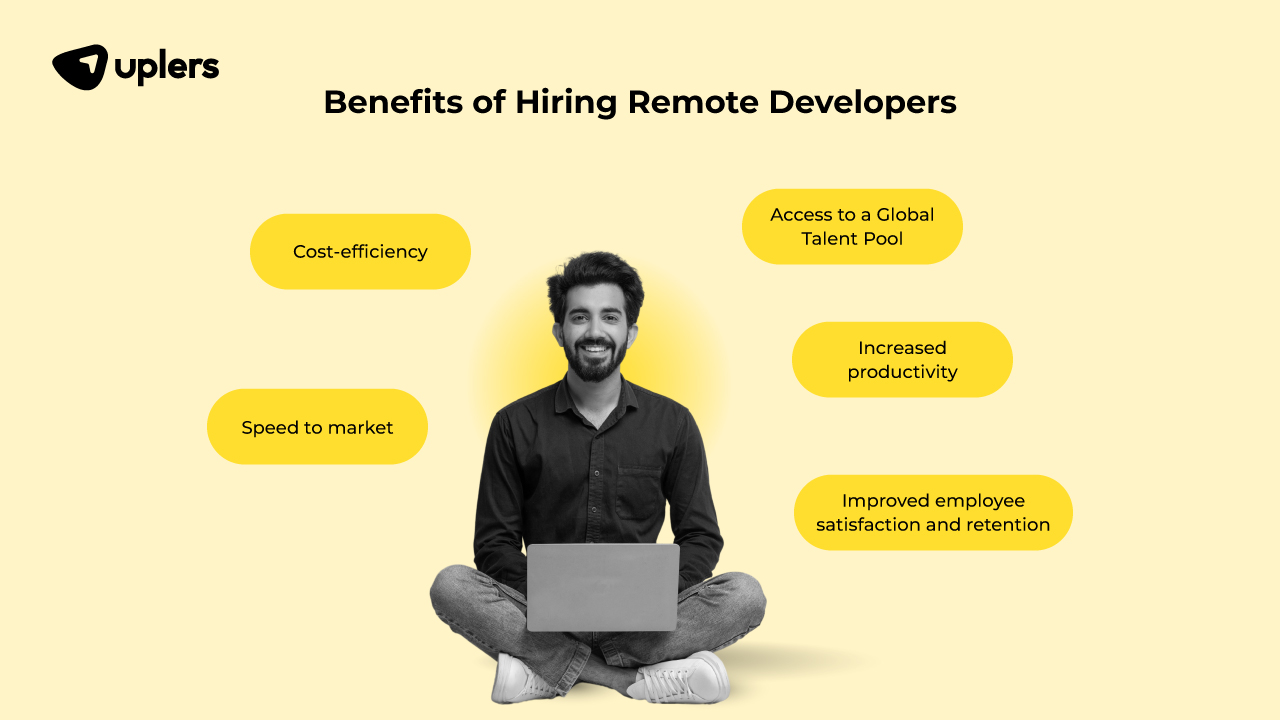5 Reasons to Hire Remote Developers for a Startup
- Shachi Dixit
- July 23, 2024
- 6 Minute Read

Does the thought of ‘remote hiring’ strain your mind and is there a lot of debate between the pros and cons of this approach? We get your pain area and this blog is intended to give you the closure that you need, on how to hire developers for a startup, acquire the best talent without breaking the bank, and launch your product at rocket speed.
Managing remote teams dispersed across different time zones and locations can sound challenging and an unsure thought. But, when you familiarize yourself with the benefits of remote recruitment, you will realize that it’s not a mere trend, but a strategic move with numerous benefits. According to a Gartner press release, 74% of the companies intend to shift some of their employees to a permanent remote hiring model.
As a growing startup, it’s a wise call to choose tech hubs like India to resolve the demand-supply gap and get you premium quality talent within your budget. Indian talent is a rising force in today’s global workforce among reputed brands like Google, Amazon, IBM, and many Fortune 500 companies.
Let’s deep dive into the strong suit of hiring remote developers for your startup and how Indian talent makes a difference. Consider this as your friendly guide to envision the remote hiring landscape and scroll with curiosity to help your business thrive.
Benefits of Hiring Remote Developers

When you choose to hire talent locally there are a myriad of challenges including a saturated talent pool, expense and time constraints, compromising talent quality in the hiring rush, higher retention rates, etc.
For 69% of the companies talent shortage and limited geographical access are the major hiring hindrances. This is where remote work can enter the picture in full swing with its countless benefits:
1. Access to a Global Talent Pool
When you are restricting your search for the right talent to geographical boundaries, you can only expect a small sample size of talent. Additionally, you might have to compromise on their quality for cost-cutting and the hiring rush. This means you will have to invest in their upskilling to reduce the employee turnover ratio.
This is where remote recruitment blurs the geographical hiring disparities and provides you access to a global workforce. You can access an untapped market to hire the best in the industry.
2. Cost-efficiency
Remote hiring can be pocket-friendly by eliminating expenses like electricity, office space, food, office supplies, and other on-site costs. You also get to explore the talent-rich regions at cost-effective rates.
Salaries for remote developers in countries like India tend to be more competitive compared to local talent. The low cost of living supplements low development costs in India. This cost advantage can allow your startup to allocate more resources for growth and innovation in the business.
3. Increased productivity
Remote jobs have a huge traction from job seekers primarily because of the flexibility in the work hours. They can avoid the typical 9-5 grind and work during their productive hours for a healthy work-life balance.
As per a survey, 85% of global businesses agreed that location flexibility boosts productivity due to fewer distractions for the employees. This benefit of hiring remote developers also indicates that you can scale your team size and adapt to market changes quickly, which is the key factor for startup success.
4. Speed to market
Traditional on-site hiring is considerably a time-consuming errand for hiring managers with the scope of project delays. But, with remote hiring, you can have a streamlined hiring process to assemble your team and begin your project quickly.
This speed to market is essential for your startup to be able to respond swiftly to the market demands and stay competitive. An agile time-to-market your product can turbocharge your startup journey with a sizable positive impact.
5. Improved employee satisfaction and retention
According to a report from FlexJobs, 80% of the employees cited improved mental health and 83% claimed a decrease in stress levels. The flexibility and work-life balance enhance employee satisfaction and increase retention.
Satisfied employees are considered to be a valuable and long-term resource for your startup, ensuring project continuity.
We know, what’s the next thought in your mind! What about the flip side of the coin; the challenges and ways to address them effectively? We are getting there in the next section, so hold your train of thought and continue reading.
Common Challenges in Managing Remote Teams
Yes, managing remote teams can be overwhelming considering the following stumbling blocks:
- Communication can be the biggest hurdle considering distinct time zones and varying levels of common language proficiency.
- Coordinating meetings and progress calls can be difficult due to different time zones.
- Monitoring the performance and productivity of remote employees can be challenging.
- Building a cohesive team culture without face-to-face interactions.
- Ensuring access to the required tools and resource repository without any technical loopholes.
Regular check-ins, clear documentation, and leveraging fine-rated collaboration tools can be some ways to overcome these challenges. But, one effective strategy that is a sure shot in conquering these disputes is hiring Indian remote talent.
Why India is a Dominant Player in the Global Remote Recruitment Market
India has become a prime destination for remote talent acquisition for global hiring managers due to its surplus talent supply. The country is home to over 5 million software developers, with more and more qualified professionals getting added each passing year.
Adobe, Google, Microsoft, Facebook, and many other market leaders who have no budget constraints have Indian talents in the top hierarchy. Considering their large-scale operations, they can hire from anywhere in the world Why do they prefer Indian remote talent?
India is regarded as the powerhouse of skilled talent and has a budding prominence in the global hiring markets for the following reasons:
- Talent surplus can resolve the demand-supply gap.
- Affordable talent with uncompromised quality.
- 6 out of 10 companies prefer hiring Indian talent as they are resourceful, adaptive, smart, and hardworking.
- India has friendly relations with other countries making it the safest bet and obvious choice for remote recruitment.
- Having global exposure Indian developers are highly regarded for their technical expertise and communication proficiency.
- India is located in a convenient time zone for European and Western countries making it easy to handle the time-zone disparity.
Apart from these, what you might not know is that India is also home to some highly credible and reputed talent networks. Uplers could be your one-stop answer to how to hire developers for a startup.

We are a one-stop hiring platform where we bridge the gap between talent and hiring managers. With our AI-vetting hiring process, we shortlist the top 3.5% of candidate profiles from our 1M+ talent network and flood these in your inbox. All this is done within 48-72 hours of raising the request with zero grunt work for hiring managers.
By partnering with such platforms you are not only gaining access to top-tier Indian remote talent but also getting quality talent at up to 40% cost-effectiveness.
Revolutionize Your Remote Hiring Process with Uplers
If you are a startup you must not live in the present but also think long-term when you are hiring remote talent. When you are making an investment shouldn’t you measure its worthiness in the future?
With respect to this, the future of remote work looks promising as more and more companies are realizing its benefits. According to a Forbes report, 98% of the workers want to work remotely and by 2025, 32.6 million Americans are expected to work remotely.
With the evolution of advanced tools and technologies managing remote teams has become more feasible and sophisticated.
At the start of 2020 when remote hiring was fairly new to accept for global companies, there were several challenges such as where to find remote talent, how to manage the time zone and cultural differences, how to ensure optimal employee productivity, onboarding hassle, etc.
That’s when hiring managers turned to hiring Indian remote talent due to the access to an extensive talent network, cost-effectiveness, flexibility and scalability, and several other perks of hiring from India. Ever since India has emerged as a preferred destination to bridge the demand-supply gap.
As a startup embracing remote hiring can be a major competitive edge for your success. Sidestep the hassle of how to hire developers for a startup with Uplers and take the plunge to outshine your competitors and transform your startup’s future.
Uplers serves as a one-stop hiring platform with its 1M+ talent network spread across 5+ time zones. You can connect with the top 3.5% of AI-vetted candidate profiles from India at up to 40% cost savings. This eliminates the hiring hassle from start to finish with guaranteed superior talent quality in your team.

Thank you for submitting the details!
We will keep your information safe. Feel free to contact us with any questions at hello@uplers.com
Please check your email for next steps shared by Robert.

















